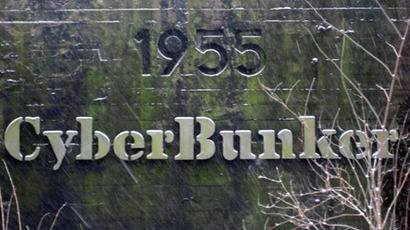Revealed: UK secretly arrested 16-year old boy for world’s ‘biggest’ DDoS-attack

In a surprise development, it has been reported that several months ago Britain’s National Cyber Crime Unit “secretly” arrested a 16-year-old London schoolboy on suspicion of being involved in the “biggest cyberattack in the history of the Internet.”
The arrest of the teenager, whose name is not being disclosed, is
a part of the investigation into the
distributed-denial-of-service (DDoS) attack on Spamhaus on March
20 this year. That day, servers of the Dutch anti-spam
organization, which tracks e-mail spammers and spam activity,
were at one point being inundated with 300 billion bits per
second (300Gbps) of data, three times larger than the previous
record attack of 100 Gbps.
The teenager fell under suspicion after “significant sums of
money” were found to be “flowing through his bank account,”
the London Evening Standard reported Thursday.
“The suspect was found with his computer systems open and
logged on to various virtual systems and forums,” the daily
cited a briefing note by the National Cyber Crime Unit.
According to the Evening Standard, the arrest was made in April
at the boy’s home in southwest London, but details of it were
just recently disclosed to the newspaper “ahead of the
formation of the government’s new National Crime Agency.”
The newspaper did not say whether criminal charges had been
brought against the boy, if he was being held in custody and
whether he was providing police with information about possible
associates.
The teenager’s arrest came during a series of coordinated raids
in an investigation codenamed Operation Rashlike.
Another arrest was also made in April in Spain. A 35-year-old
Dutchman was detained and his computers, data carriers and
mobile phones were seized.
The man’s name was not made public, but media speculated that the
man was Sven Olaf Kamphuis, the spokesman for Internet service
provider CyberBunker.
In a statement, the Dutch government referred to the arrested
suspect merely as "SK."
In a statement Sunday, the Spanish Interior Ministry revealed in
a statement that its police force had arrested the man
responsible for the attacks in response to a European arrest
warrant, which stemmed from an investigation initiated by Dutch
authorities.
The March 20 attack on Spamhaus was described as the biggest in
history, causing a global Internet slowdown. Spamhaus’s chief
executive, Steve Linford, said at the time that the scale of the
attack could knock out governments’ Internet infrastructure.
However, despite being dubbed by many as the biggest DDoS attack
in history, Kaspersky Labs Global Research & Analysis Team
told RT that the majority of Internet users
worldwide most likely did not notice any disruption.
The DDoS attack was believed to have been sparked when non-profit
group Spamhaus placed CyberBunker on its blacklist of sites to be
blocked for spreading spam.
However, in a March interview with RT, Kamphuis denied that CyberBunker was behind the attack and instead pointed the finger at Stophaus.com, a large collective of Internet providers around the globe.
He also called Spamhaus “the largest threat to the freedom of
the Internet at the moment” and accused the company of
falsely labeling people spammers when they were not.













